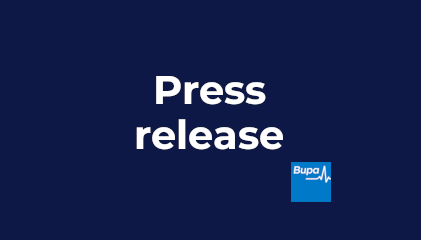Global business leaders are continuing to risk their wellbeing and mental health with unsustainable working practices
- A quarter (25%) of global business executives admit to ‘binge working’, with the same proportion (25%) regularly working longer than 60-hour weeks
- However, the increase in flexible and remote working is driving down these unsustainable working practices
- Globally, only the US sees an increase in binge working for those who choose to work remotely, with the biggest positive impact seen in Egypt
- A quarter (25%) of remote workers still admit to binge working, and nearly one in five (19%) experienced low mood and anxiety
- The findings from the most recent Bupa Global Executive Wellbeing Index demonstrate how flexible and remote working can benefit even the most senior employees reduce burnout and stress
Global business leaders are continuing to risk their wellbeing and mental health with unsustainable working practices, according to the latest Bupa Global Executive Wellbeing Index.
The research found that a quarter of (25%) executives worldwide are ‘binge working’, or working intensive, long hours for days at a time before taking breaks, with the same number (25%) regularly working more than 60 hours a week without breaks. Almost two-fifths (39%) of French executives admitted to binge working, the highest of any of the countries included in the study, followed by the UAE (35%) and Egypt (44% %).
However, changing ways of working - including the trend towards flexible and remote work - are having an impact on how executives approach their work life. Almost a third (30%) of global leaders who work only from the office admit to binge working, with that figure dropping to just a quarter (25%) of those who work remotely. For 60-hour weeks the data is even more significant - one in three (33%) office-only workers regularly exceed 60 hours of work each week, compared to just a fifth (20%) of remote workers.
The Global Picture
At a regional level, only American executives did not follow this pattern. Where business leaders in every other country included in the study were less likely to binge work if they worked remotely, senior executives in the US were significantly more likely to do so (23% of office-only workers vs 32% of remote workers). Egyptian executives saw the greatest benefit from remote working - binge working was reduced from 44% to just 26 %.
Anthony Cabrelli, Managing Director of Bupa Global said: “The last two years have put incredible pressure on business leaders, and it’s no surprise that some have fallen into unsustainable working practices, including long hours and ‘binge working’. However, overworking can have a detrimental impact on productivity and mental health, and it’s encouraging to see that many executives are changing how they choose to work in order to improve their work-life balance and mental health.
“It’s clear from the findings of the latest Bupa Global Executive Wellbeing Index that remote working can have a significant impact on better health and wellbeing by reducing long hours. It’s important that all organisations are considering how they can use new ways of working to role-model healthier lifestyles to their people, most importantly by those in the most senior roles.”
Although remote working was found to have a positive impact on working habits for senior leaders, one in four (25%) business executives globally choosing to work more flexibly still admitted to binge working. In some cases, remote working was found to have a negative impact on mental health for business leaders. Nearly one in five (19%) of those who worked remotely said they had experienced low mood and anxiety, a higher proportion than office-only workers (15%).
Tackling unsustainable working habits
Given the sustained pressure that global business leaders have been under for the past two years, it’s not surprising that instances of unsustainable working habits are so prevalent. With this in mind, Bupa Global, the premium international health insurer, has put together a series of best practices to help senior leaders remain productive while improving their wellbeing.
1. Lead by example when it comes to organisational working habits
There has been a big shift towards a greater focus on employee wellbeing over the last couple of years, but this has not necessarily been reflected in the working habits of upper management. By modelling good working habits - including leaving work on time and taking appropriate breaks - senior leaders can support their employees and also reap the benefits of a better work-life balance.
2. Schedule breaks, and stick to them
Business leaders are always in demand, and it can sometimes feel like there is no moment of the day that isn’t taken up by an urgent conversation or important meeting. However, working consistently with no breaks is detrimental to mental health, and can reduce productivity - so it’s important that business leaders incorporate regular breaks, and make teams aware that these are not to be scheduled over.
3. Delegate and prioritise
There will always be elements of a business that can only be managed by a senior leader, but it’s when executives feel they have to handle everything that binge working can occur. By being clear about what actions are priorities, and which can be handled by other personnel within the organisation, leaders can spend their time and resource on the elements of the business that really need their input and reduce the risk of binge working.
About the research
The Bupa Global Executive Wellbeing Index 2022 analyses research conducted between 3rd of August and 7th of September 2022 among 2439 high net worth individuals (HNWIs) across eight countries and regions, including UK, U.S., France, UAE, Egypt, China, Hong Kong and Singapore. This is referred to as ‘global research’.
Research was conducted via online survey by Censuswide. HNWIs are defined as those with over £$1M in annual salary and investable assets (excluding property or workplace pensions). Of the 2439 respondents, 2399 are working, 1831 are board level executives* and 541 are CEOs.
Censuswide abides by and employs members of the Market Research Society which is based on the ESOMAR principles.
*Job titles include: Owner/proprietor, Partner, Chairman, Chief Executive, Managing Director, Other board level manager/director. They are referred to as ‘global board executives/directors’ or ‘global/senior leaders’.



